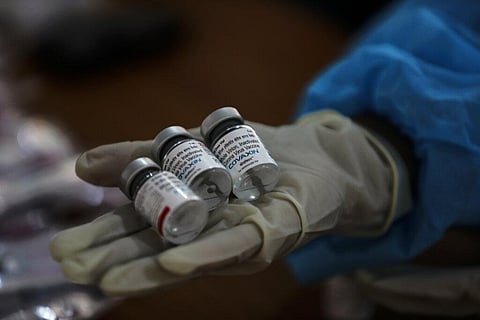

NEW DELHI: Several countries are now weighing the option of mixing and matching Covid vaccines amid supply delays and safety concerns after evidence from scientific studies have indicated that it may work, but the proposition is not being explored in India presently, authorities told The New Indian Express.
The first findings of an Oxford University-led study, supported by another study in Spain, found that people who received Pfizer's vaccine followed by a dose of AstraZeneca's, or vice versa, were more likely to report mild or moderate common post-vaccination symptoms than if they received two of the same type.
Also, the combination of two vaccines showed that they were highly effective against Covid infection.
Officials involved in Covid vaccine administration in India, however, said that the top priority for the government and scientists now is to ensure the quick management of Covid second wave and ensuring enhanced vaccine supply to states.
“We have discussed the new scientific evidence but there is no plan as such to carry out any related research in the country, which will essentially mean conducting clinical trials in people with two different vaccines,” said Samiran Panda, chief epidemiologist at the ICMR and a senior member of the National Expert Group on Vaccine Administration for Covid19.
The same was confirmed by a top official in the Union Health Ministry. The stand taken by the government so far found support in some specialists who fee; that the immediate priority for the country would be to ensure quick supply of vaccines.
“From an immunology viewpoint mixing two types of vaccines is not a problem. But studies show some more reactogenicity or minor side effects,” said virologist Shahid Jameel. “Whether it can or should be explored in India will depend upon the basket of vaccines available in India. At this point we should not divert our attention from increasing vaccines supply,” he said.
In India, three vaccines are available for use at present, Covishield (AstraZeneca’s Indian version), Covaxin and Sputnik V.
While Covishield and Sputnik V are made on viral vector platforms using adenoviruses, Covaxin is an inactivated vaccine — which means that it is made up of killed SARS CoV 2.
So far, there has been no study in India on mix and match of vaccines even though the country is struggling to scale up its vaccination drive and ensure a wide inoculation coverage to a large population in order to avoid future waves of the pandemic.
Some experts on the other hand backed such research in Indian context.
“It may be an interesting proposition, given the variant strains that are running amok at present. There are apprehensions around wild-type spike-directed vaccines falling short on curbing some of the new variants,” said immunologist Dipyaman Ganguly.
“Combining with another attenuated whole virus vaccine in different dose combinations may come out to be a better shield against the variants with spike-directed mutations. But all these require properly designed trials before taking any decision.”